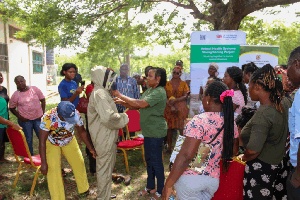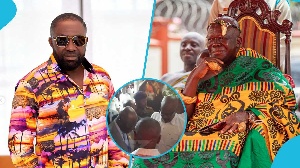- Home - News
- Elections 2024
- News Archive
- Crime & Punishment
- Politics
- Regional
- Editorial
- Health
- Ghanaians Abroad
- Tabloid
- Africa
- Religion
- Photo Archives
- Press Release
General News of Monday, 26 May 2025
Source: www.ghanawebbers.com
World Bee Day 2025: UK-Ghana bee partnership buzzes with innovation and empowerment
The UK government is highlighting the impact of its Department for Environment, Food and Rural Affairs (Defra) in Ghana.
This is through the Animal Health System Strengthening (AHSS) Project.
The initiative shows how international partnerships can promote sustainable development. It also supports climate resilience and global health security. This comes as the world celebrates World Bee Day 2025.
This year’s theme is “Bee Engaged with Youth.” The AHSS Project equips Ghana’s institutions, women, and academic communities. It provides tools for climate-smart beekeeping and modern veterinary education.
Key achievements include developing Ghana’s first Bee Health Manual. The project has created apiaries and integrated bee health into university curricula.
The project fosters collaboration between Ghanaian institutions and UK partners. Notable partners include Kwame Nkrumah University of Science and Technology (KNUST) and the University of Glasgow.
These partnerships have led to curriculum development and specialized training for academics. They have also strengthened veterinary education in Ghana.
A success story is Dr. Emmanuel Dongbataazie Piiru. His research in honeybee pathology expands knowledge in this critical area.
Under Professor Benjamin Emikpe's leadership, KNUST introduced a new course on Micro-Livestock Medicine. This course includes honeybee health along with topics like artificial intelligence and climate-sensitive diseases.
Women play a vital role in the project’s success. Martha Adjorlolo stands out; she transitioned from administration to beekeeping after training in the UK.
She now manages her own apiary and co-founded the National Association of Women Bee Farmers, which has over 80 members.
British High Commissioner to Ghana, Harriet Thompson, praised the project's significance. She stated that the UK is proud to partner with Ghana on sustainable agriculture through Defra-AHSS.
Thompson noted that this initiative protects pollinators while empowering women, youth, and academic institutions. On World Bee Day, she emphasized collaboration's power to create lasting impact.
Professor Benjamin Emikpe also praised the project’s achievements at KNUST. He called it a game-changer for Ghana’s honeybee sector.
Emikpe highlighted that it strengthens veterinary education and creates economic opportunities for rural communities. He expressed gratitude for UK support and hopes to deepen this partnership further.
The AHSS Project helps reduce poverty by generating income opportunities in rural areas. It promotes entrepreneurship while positioning honey as a promising export commodity.
Ghana's honey market grew by 25% in 2023, reaching $154,000 in value.
Aligned with Ghana’s Climate Prosperity Plan, the project supports biodiversity conservation and sustainable agriculture.
It also advances goals set by the UK Foreign Secretary for re-engaging with the Global South while tackling climate change.
Through education, research, and community engagement, this partnership builds a resilient honeybee sector in Ghana—embodying World Bee Day's spirit.
Business










